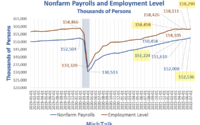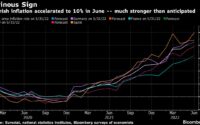Japan loses crown as world’s third-largest economy after it slips into recession | Japan
Japan has been eclipsed by Germany as the world’s third-biggest economy and has slipped into recession, according to data released Thursday, as the country battles a weak yen and an ageing, shrinking population.
Japan’s economy, now the world’s fourth-biggest, grew 1.9% in 2023 in nominal terms – meaning it is not adjusted for inflation – but in dollar terms its gross domestic product (GDP) stood at $4.2tn compared with $4.5tn for Germany.
The shift, coming more than a decade after it ceded second place to China, has been attributed to the yen’s sharp falls against the dollar over the past two years. A weaker yen eats into profits on exports when earnings are repatriated. The Japanese currency dropped by almost a fifth against the US dollar in 2022 and 2023, including a 7% fall last year.
Like Japan, Germany is resource poor, has an ageing population and is heavily dependent on exports. Europe’s biggest economy has also been shaken by rising energy prices caused by Russia’s war in Ukraine, rising interest rates in the eurozone and a chronic shortage of skilled labour.
While Japanese carmakers and other exporters have benefited from a weak yen – which makes their goods cheaper on the international market – the country’s labour crunch is worse than Germany’s, and it is struggling to address a low birthrate.
The failure of government-led attempts to boost the birthrate means chronic labour shortages are expected to worsen, even as the country welcomes a record number of foreign workers.
The economy revitalisation minister, Yoshitaka Shindo, told reporters that Germany leapfrogging Japan showed it was “imperative” to promote structural reforms, including getting more women into full-time work and lowering the barriers to foreign investment.
“We will deploy all policy steps to support pay rises” to encourage demand-driven growth, Shindo said, according to the Kyodo news agency.
Thursday’s data showed that real GDP – the total value of goods and services – shrank 0.1% in the last three months of 2023 compared to the previous quarter, due to weak spending by households and businesses, according to the cabinet office.
Private consumption, which accounts for more than half of all economic activity in Japan, fell 0.2% as households struggled with the rising cost of living and a fall in real wages.
Growth for the previous quarter was also revised downward to -0.8%, meaning that Japan is in technical recession – typically defined as two consecutive quarters of contraction.
During the boom years of the 1970s and 80s, some predicted that Japan’s cheap, good-quality exports of autos and consumer electronics would see it overtake the US as the world’s biggest economy.
Instead, the bursting of Japan’s asset-inflated bubble economy in the early 1990s ushered in several “lost decades” of economic stagnation and deflation.
The latest data reflect the realities of a weaker Japan – one that can expect to have less of a presence in the global economy, said Tetsuji Okazaki, a professor of economics at the University of Tokyo. “Several years ago, Japan boasted a powerful auto sector, for instance. But with the advent of electric vehicles, even that advantage has been shaken,” he said.
In 2010, China’s newly acquired status as the world’s second biggest economy prompted a bout of soul-searching in Japan about its ability to keep pace with emerging economies.
While Japan’s recent slip to fourth place has been attributed to dramatic currency moves, losing third spot to a troubled German economy will deal a blow to its self-esteem and to the already unpopular prime minister, Fumio Kishida.
And the slide is unlikely to end there. India’s economy, buttressed by a large and growing young population, is projected to overtake Japan in 2026 and Germany the following year, according to the International Monetary Fund.
The Nikkei business newspaper said in a recent editorial that Japan had failed to raise its potential for growth – a predicament economists have attributed to its demographic crisis.
“This situation should be taken as a wake-up call to accelerate neglected economic reforms,” the Nikkei said.
[ad_2]
Source link


